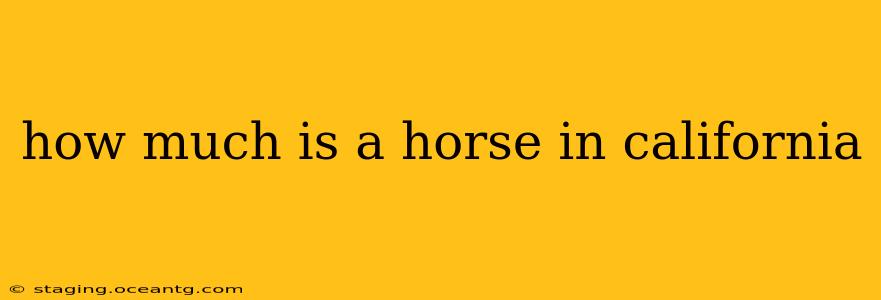How Much is a Horse in California? A Comprehensive Guide to Horse Prices
The price of a horse in California, like anywhere else, varies dramatically depending on a multitude of factors. There's no single answer to this question, but understanding these factors will help you determine a realistic budget. This guide breaks down the key influences on horse cost and answers frequently asked questions.
Factors Affecting Horse Prices in California:
- Breed: Thoroughbreds, Arabians, and certain Warmbloods can command significantly higher prices than less popular breeds. Established bloodlines and championship lineages further inflate the cost.
- Age: Young horses (under 5 years) are generally more expensive due to their potential and unknown future. Older horses, especially those with proven experience, may be cheaper but could have pre-existing health conditions.
- Training and Experience: A horse trained in specific disciplines (dressage, jumping, western riding) will be more expensive than an untrained horse. Experience in a specific field greatly increases value.
- Health and Conformation: A healthy horse with sound conformation (body structure) will cost more than one with health issues or structural imperfections. Veterinary records are crucial.
- Location: Horse prices can vary regionally within California. Areas with higher concentrations of horse farms and equestrian communities may have higher prices.
- Seller: Private sellers often offer lower prices than established breeders or dealers. However, thorough vetting is vital when buying from a private seller.
What are the average prices for different types of horses in California?
This is difficult to pinpoint with exact figures, as the market fluctuates. However, you can expect a broad range:
- Untrained, young horses of common breeds: $1,000 - $5,000
- Well-trained horses in popular disciplines: $5,000 - $50,000+ (Some high-performance show horses can cost hundreds of thousands).
- Older horses with known experience: $1,000 - $10,000+ (depending on health, experience, and breed)
- Miniature Horses: Prices range widely depending on size, lineage, and training, typically between $500 and $5,000.
How much does it cost to keep a horse in California?
Beyond the initial purchase price, consider ongoing expenses:
- Boarding: Monthly boarding fees in California can range from $400 to $1,500 or more, depending on the level of care, facilities, and location.
- Feed: High-quality feed is essential. Monthly costs can easily reach $300 - $500 or more, depending on the horse's size, workload, and dietary needs.
- Veterinary Care: Routine checkups, vaccinations, and potential emergency care can add up significantly. Budget for at least $500 - $1,000 annually, but more is possible for unexpected needs.
- Farrier Services: Regular hoof trimming and shoeing is crucial. Expect to pay $50 - $100 per visit, every 6-8 weeks.
- Equine Insurance: Protecting your investment is wise. Costs vary widely based on the horse's value and coverage.
- Tack and Equipment: Saddles, bridles, and other riding equipment represent a significant upfront investment.
What are the hidden costs of horse ownership?
Beyond the regular expenses, unexpected costs can arise:
- Dental Care: Regular dental checkups and procedures are important for horse health.
- Injury or Illness: Unexpected veterinary bills can be substantial.
- Transportation: Hauling your horse to events or the vet incurs costs.
Where can I find horses for sale in California?
Many avenues exist:
- Online Classifieds: Websites like Craigslist, Facebook Marketplace, and specialized equine sales sites.
- Equine Auctions: Auctions can provide various options, but careful inspection is essential.
- Breed-Specific Organizations: Connect with breeders of your preferred breed.
- Local Horse Trainers and Dealers: They often have horses available for sale.
What questions should I ask before buying a horse in California?
Thorough due diligence is crucial. Ask about:
- Complete Veterinary History: Request detailed records, including vaccinations and any past injuries or illnesses.
- Training History: Understand the horse's past experiences and training level.
- Temperament and Behavior: Spend time with the horse to assess its personality.
- Reason for Sale: Knowing why the seller is parting ways with the horse can offer valuable insights.
Buying a horse is a significant commitment. Thorough research, careful consideration of the expenses involved, and a realistic assessment of your capabilities are vital before making a purchase. Remember, the price is just one piece of a much larger puzzle.
